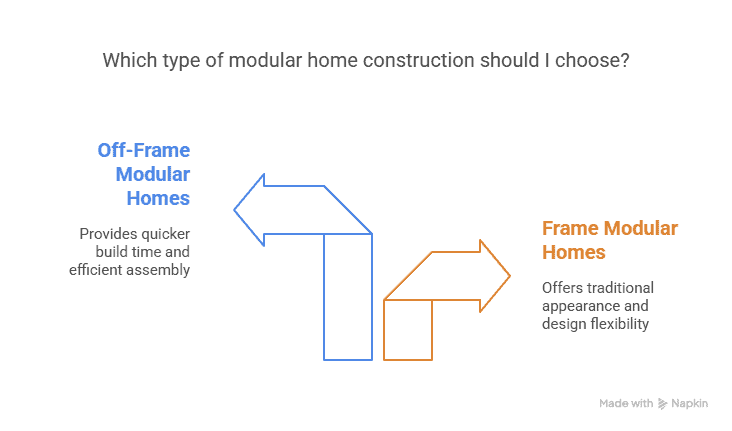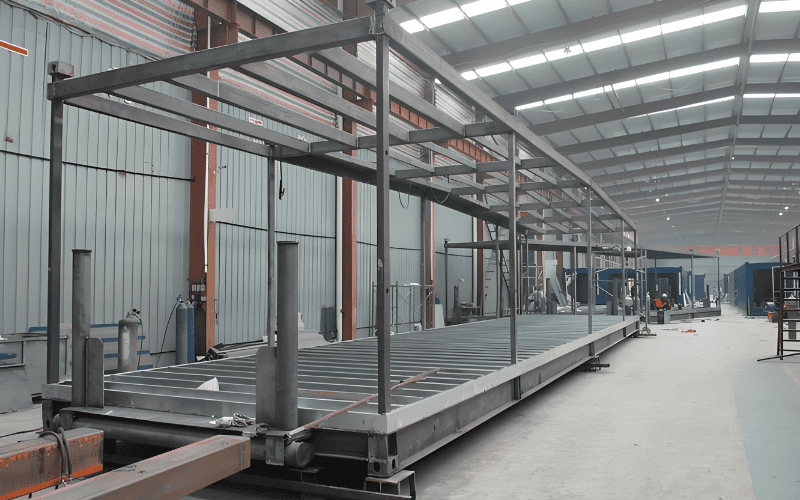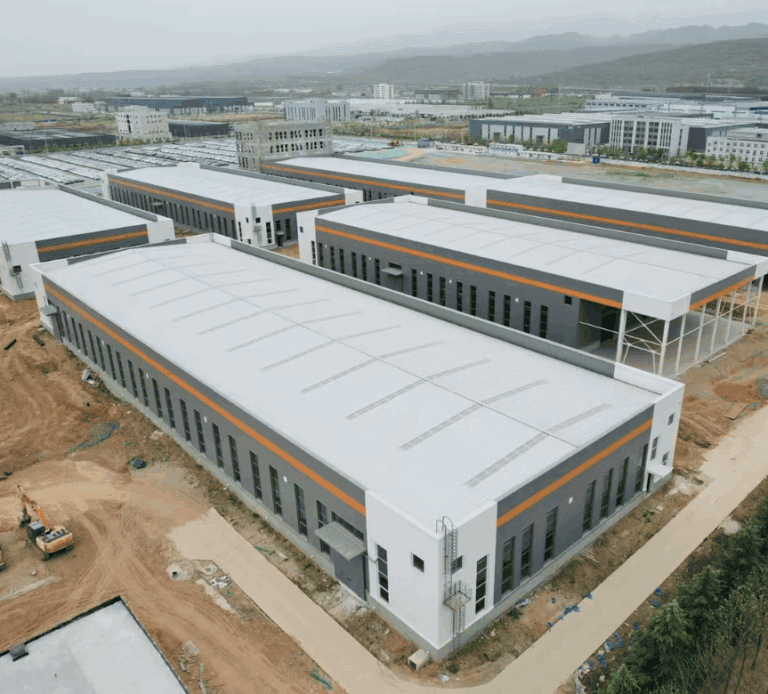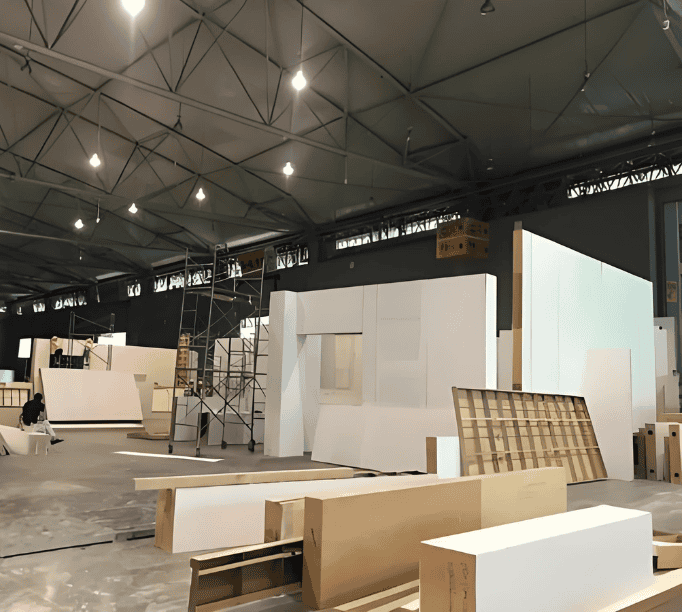Choosing between an on frame modular home and an off frame modular home can be confusing — both offer speed, flexibility, and efficiency, but serve very different purposes.
In this guide, we’ll explain what each construction method means, outline their key differences, and show the advantages of both types to help you make the right choice. You’ll also learn how modern steel frame modular systems enhance durability, insulation, and mobility, along with expert insights from SteelPRO PEB, a global manufacturer of pre-engineered modular and PEB structures.
By the end, you’ll understand the foundation requirements, lifespan, and customization options of each model — and know exactly which modular structure fits your long-term goals.
What is On Frame Modular Construction?
On frame modular construction refers to homes built on a permanent foundation, typically using a steel or concrete frame. The modules are placed on this frame and connected to form a stable, long-lasting structure.
This approach is perfect for homeowners aiming to establish a permanent dwelling. It begins with preparing the foundation, upon which modular components are subsequently assembled. The final product is a sturdy and enduring home capable of enduring the passage of time and varying weather conditions.
If you want a home designed for long-term use, an on frame modular home offers reliability and customizability. However, once installed, it’s not easily relocated. This makes it best suited for people planning to settle in one place.
What is Off Frame Modular Construction?
Off frame modular construction refers to homes that are not built directly on a permanent foundation. Instead, the modules are placed on a temporary base, such as a trailer or other transportable platform. This setup allows the home to be relocated more easily compared to on frame homes.
Unlike on frame modular homes, off frame homes offer greater mobility and flexibility. They can be easily transported from one site to another as required, rendering them perfect for individuals who anticipate relocating or require temporary accommodation solutions.
Off frame modular homes are also more customizable in terms of design. Whether you’re looking for a smaller temporary dwelling or a more spacious, mobile home, these units can be tailored to fit your needs. This adaptability renders them an excellent choice for short-term stays or for those anticipating frequent relocations.

On Frame vs Off Frame Modular Construction: Key Differences
Understanding the differences between on-frame and off-frame modular construction is essential before choosing the right type of modular home.
| Feature | On Frame Modular | Off Frame Modular |
| Foundation | Permanent foundation (Concrete or Steel) | Temporary base (Trailer or Transportable Platform) |
| Mobility | Fixed — not designed to relocate | Relocatable — can be moved between sites |
| Lifespan | 50+ years | 20–30 years |
| Typical Use | Permanent housing, offices, schools | Temporary housing, site cabins, mobile units |
| Energy Efficiency | High due to better insulation and sealed joints | Moderate — depends on chassis insulation |
| Maintenance | Low, due to stable foundation | Higher, as temporary bases may wear faster |
In short, an on-frame modular home sits permanently on a foundation, while an off-frame modular home can be relocated — a key distinction that affects cost, durability, and resale value.
Structure and Foundation
The primary difference between on frame and off frame modular homes lies in their foundation. On frame modular homes are built on a permanent foundation (such as concrete or steel), providing strong support and stability for long-term use. This foundation ensures durability, making these homes suitable for permanent locations.
In contrast, off frame modular homes are placed on a temporary base (e.g., a trailer or transportable platform), which allows for greater mobility but reduces long-term stability. While off frame homes are ideal for short-term use or relocation, they are less durable and more vulnerable to wear and tear.
Installation Process & Time to Complete
On frame homes require more time to install due to the need to prepare a permanent foundation. Although the installation process is more extended and intricate, it ultimately yields a more stable and enduring structure.
Off-frame homes offer a faster setup due to the absence of the need for a permanent foundation. The modules are placed on a temporary platform, allowing for faster installation and making them ideal if you need to move in quickly. Therefore, off frame homes can be completed much faster than on frame homes.
On frame modular vs Off frame modular: Cost & Value
- Initial Cost: On frame homes typically have a higher initial cost because of the permanent foundation and additional labor involved. However, they offer long-term stability and value.
- Long-Term Costs: While off frame homes may be cheaper initially, they may incur higher maintenance costs due to their less stable base and potential need for more frequent repairs. Conversely, on-frame homes generally necessitate less maintenance over time owing to their robustness.
- Value: On frame homes tend to have a higher property value due to their permanent nature and stability. Over time, they have the potential to increase in value. Off frame homes, being more temporary, generally do not appreciate in value as much and may have lower resale value, especially if moved frequently.
Flexibility & Customization
Off frame homes offer more flexibility in terms of design and relocation. They can be easily moved to different locations, making them a great option for those who expect to relocate or need a temporary living space. Additionally, off frame homes can be customized in various ways to suit different needs and configurations.
On frame homes, while customizable in terms of interior layout and finishes, are meant to stay in one location. They are not as flexible for relocation once installed, though their design can still be adapted to meet specific preferences.
Durability and Lifespan
On frame homes are built to last for the long term. Their permanent foundation offers stability, making these homes more durable and capable of withstanding a variety of environmental conditions. They are ideal for long-term use and can last many years with minimal wear.
Off frame homes have a shorter lifespan. Their temporary base makes them more vulnerable to wear and tear, and they may need more frequent repairs. Over time, off frame homes are less durable than on frame homes, especially in harsher climates.
Maintenance
On frame homes generally require less maintenance due to their stable foundation and solid structure. With adequate maintenance, they can sustain their good condition for numerous years with minimal issues arising.
Off frame homes, however, tend to need more frequent maintenance. The temporary base can wear out over time, leading to higher costs and more attention needed to maintain the home. These homes are less resilient in the long run and may require repairs sooner.
Energy Efficiency & Environmental Impact
On frame homes typically offer better energy efficiency due to their permanent foundation and better insulation, which helps maintain stable interior temperatures and reduce energy costs. Although the initial environmental impact of the foundation can be higher, these homes can be designed with sustainable materials to reduce long-term effects.
Off frame homes are less energy-efficient, as their temporary base often lacks proper insulation, leading to higher heating and cooling costs. Their environmental impact is initially lower, as no permanent land development is needed, but if used for long periods, they may have higher environmental costs due to inefficiency in energy use.
Local Building Codes and Regulations
On-frame homes are governed by stricter building codes and regulations, as they are constructed on a permanent foundation. This requires more time for approval and inspections, but ensures the home meets higher standards for durability, safety, and long-term living.
Off frame homes, being more temporary, generally face fewer regulatory requirements. While this can simplify the building process and reduce approval times, it may limit their use in some locations or make them unsuitable for long-term residential living.

Advantages of On Frame Modular Construction
Stability and Durability
On frame modular homes are widely regarded as more stable and durable compared to off frame homes. The permanent foundation provides strong support, which helps these homes withstand various environmental conditions, such as extreme weather or shifting ground. This stability is especially important for long-term living, as it ensures the home remains secure and intact for many years, reducing the likelihood of settling or structural issues that could arise over time.
Cost-Effective for Permanent Housing
For those looking to settle down in one location, on frame modular homes can be the most cost-effective choice in the long run. Despite a potentially higher initial cost attributed to the requirement for a permanent foundation, the long-term advantages surpass the initial expenditure. These homes typically require less maintenance and are more durable, which means fewer repairs and lower ongoing costs compared to temporary or less stable options. Additionally, their higher resale value can make them a worthwhile investment for permanent housing.
Foundation Options
On-frame homes provide a range of foundation options tailored to the specific site and your individual requirements. Some of the most prevalent types encompass:
- Concrete Slab Foundations: Ideal for flat or stable ground, these foundations are cost-effective and provide a strong base.
- Crawl Space Foundations: A raised foundation facilitates superior airflow and easier accessibility to utilities situated beneath the home.
- Basement Foundations: Ideal for areas with colder climates, this type of foundation offers additional storage space and better insulation, which can help with energy efficiency.
Each foundation type provides long-term stability and ensures that the home is securely anchored, which is essential for the durability and longevity of on frame modular homes.
Advantages of Off Frame Modular Construction
| Advantages of Off Frame Modular Construction | Description |
| Flexibility and Mobility | Off-frame modular homes can be readily transported from one site to another, making them an excellent choice for those who require frequent relocations or desire greater mobility. |
| Customizable Design Options | These homes offer greater design flexibility, allowing for customization in layout, size, and finishes to match personal preferences. |
| Easier Relocation | Perfect for renters or individuals in transition, off frame modular homes are easy to relocate, making them an ideal solution for temporary or mobile living. |
Which is Right for Your Home? On Frame or Off Frame Modular?
Choosing Based on Your Needs
When deciding between on frame and off frame modular homes, the first step is to consider what you need most. Are you looking for a permanent home that you can settle into for the long term, or do you need more flexibility to relocate as your situation changes? If stability and long-term investment are important to you, an on frame modular home may be the best choice. However, if you anticipate moving frequently or prefer the ability to customize your living space in a more flexible way, an off frame modular home might better suit your needs.
Factors to Consider
Several factors will influence your decision:
- Budget: On frame homes often have a higher initial cost due to the permanent foundation, while off frame homes are typically more affordable upfront. Consider your budget both for the initial investment and long-term maintenance.
- Location: If you’re planning to live in one place for the long term, an on frame modular home is ideal. However, if you need to move to different areas (for work or personal reasons), an off frame modular home provides the flexibility to relocate easily.
- Timeframe: If you’re in a hurry to move in, off frame homes are quicker to install and set up. On frame homes require more time for foundation preparation and installation.
- Lifestyle Needs: Think about whether you value stability and permanence more (leaning toward on frame), or if mobility and adaptability are higher priorities (leaning toward off frame).
Practical Examples
- Family in a Rural Area: A family living in a rural area might find on frame modular homes more suitable. The stability and durability provided by the permanent foundation are important in areas where weather conditions might be unpredictable, and long-term settlement is desired.
- Frequent Relocation for Work: Someone who frequently relocates for work or lifestyle reasons may benefit from an off frame modular home. The ability to easily move the home to different locations makes it an ideal solution for temporary living or for people in transition.
Steel Frame Modular Systems by SteelPRO PEB
At SteelPRO PEB, we use advanced steel frame modular technology to deliver strength, efficiency, and precision — from factory production to on-site installation.
All modular units are built with cold-formed steel structures, reducing overall weight by 20% and improving corrosion resistance by 300%. Every component is produced in-house under ISO and CE certifications, ensuring consistent quality and durability.
Our factory-prefabricated systems simplify installation, enhance seismic safety, and perform reliably even in harsh environments such as coastal, desert, or humid regions.
With 120,000 tons annual capacity and over 1,000 completed projects worldwide, SteelPRO PEB is a trusted global manufacturer of modular and PEB steel structures — combining durability, flexibility, and design freedom.
What is the main difference between on-frame and off-frame modular homes?
On-frame modular homes are built on a permanent concrete or steel foundation, making them ideal for long-term living. Off-frame modular homes, however, are set on movable bases and can be relocated easily — perfect for temporary or mobile housing.
How long does an off-frame modular home last?
With proper maintenance, an off-frame modular home typically lasts 20–30 years. SteelPRO PEB’s cold-formed steel frames extend that lifespan by providing superior corrosion resistance and structural integrity.
What foundation is required for an on-frame modular home?
An on-frame modular home requires a fixed concrete or steel foundation, depending on soil and load conditions. SteelPRO’s engineering team provides customized foundation plans to ensure maximum stability and code compliance.
Are steel frame modular homes more durable than wood?
Yes. Steel frame modular homes offer higher load-bearing strength, better fire and moisture resistance, and longer lifespan. Unlike wood, steel doesn’t warp, rot, or attract termites — ensuring durability for decades with minimal maintenance.
Can I get a factory-direct quote for a modular steel home?
Absolutely. SteelPRO PEB offers factory-direct pricing and customization for both on-frame and off-frame modular homes. Contact our engineers to get a free consultation and personalized design proposal.
Build Your On & Off Frame Modular Home with a Trusted Manufacturer
After exploring how steel frame modular systems are engineered for performance and flexibility, the next step is to bring your on & off frame modular home project to life with an experienced factory partner.
At SteelPRO PEB, we don’t just design — we manufacture, assemble, and deliver complete modular housing systems that meet your specific site, budget, and timeline needs. From the on-frame models built for permanent foundations to the off-frame units optimized for mobility, every structure is factory-produced for precision, safety, and long-term reliability.
If you’re planning a residential, commercial, or temporary modular project, our engineers can provide structural calculations, customization guidance, and cost-saving solutions — all directly from the factory floor.
Start your on & off frame modular home plan today — contact SteelPRO PEB, your certified modular manufacturer, for a factory-direct quote and technical design consultation.

